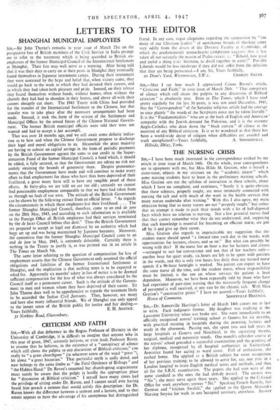LETTERS TO THE EDITOR
SHANGHAI MUNICIPAL EMPLOYEES
SLR,—Sir John Thorne's remarks in ycur issue of March 21st on the prospective fate of British members of the Civil Service in India prompt me to refer to the treatment which is being accorded 'to British ex- employees of the former Municipal Council of the International Settlement at Shanghai. Their fate may well serve as a warning. After being told that it was their duty to carry on at their posts in Shanghai they eventually found themselves in Japanese internment camps. During their internment they were sustained by the hope and belief that, when victory came, they would go back to the work to which they had devoted their careers, and in which they had taken both pleasure and pride. Instead, on their release they found themselves without funds, without homes, often without the chattels they had had to abandon in their homes, and above all with their careers abruptly cut short. The 1943 Treaty with China had provided for the transfer of the International Settlement to the Chinese, but that transfer was to take place after the necessary arrangements had been made. Instead, it took the., form of the seizure of the Settlement and Municipal Offices by the armed forces of the Chinese National Govern- ment. The former British municipal officials were told they were not wanted and had to accept a fait accompli.
That was over 18 months ago and we still await some definite indica- tion as to how and when the Chinese Government propose to discharge their legal and moral obligations to us. Meanwhile the great majority are having to subsist on capital savings in the form of periodic payments by the British Government against the sums to our credit in the Super- annuation Fund of the former Municipal Council, a fund which, it should be added, is fully secured, so that the Government are taking no risk nor unduly straining the bounds of generosity there. Despite pronounce- ments that the Government have made and will continue to make every effort to find employment for those who have thus been deprived of their livelihood, a great many have still to have any tangible proof of those efforts. At forty-plus we are told we are too old ; certainly we cannot find pensionable employment comparable to that we have had taken from us through no fault of our own. The attitude of the British Government can be shown by the following extract from an official letter. "As regards the circumstances in which these employees lost their livelihood. .. . The former Shanghai Municipal Council, therefore, came to an end de lure on the 20th May, 1943, and according to such information as is available to the Foreign Office all British employees had their services terminated by 'the de facto Council before that date." Thus the British Government are prepared to accept as legal our dismissal by an authority which had been set up and was being maintained by Japanese bayonets. Moreover, the contention that the former Shanghai Municipal Council came to an end de lure in 'May, 1943, is extremely debatable. Certainly there is nothing in the Treaty to justify it, as was pointed out in an article in The Times on March 5th.
The same letter referring to the question of compensation for loss of employment asserts that the Chinese Government only assumed the official obligations and liabilities of the former International Settlement at Shanghai,- and the implication is that nothing more is to be expected or asked for. Apparently six months' salary in lieu of notice is to be deemed sufficient compensation for the loss of what was always considered by the Council itself as a permanent career. Such is the attitude of the Govern- ment to men and women whom they have deprived of their career. Sir John Thorne does well to be apprehensive as regards the treatment likely to be accorded the Indian Civil ;Servants. They, however, are many and have also many influential friends. We of Shanghai can only appeal to the innate sense of the British public for justice and fair dealing.—


































 Previous page
Previous page